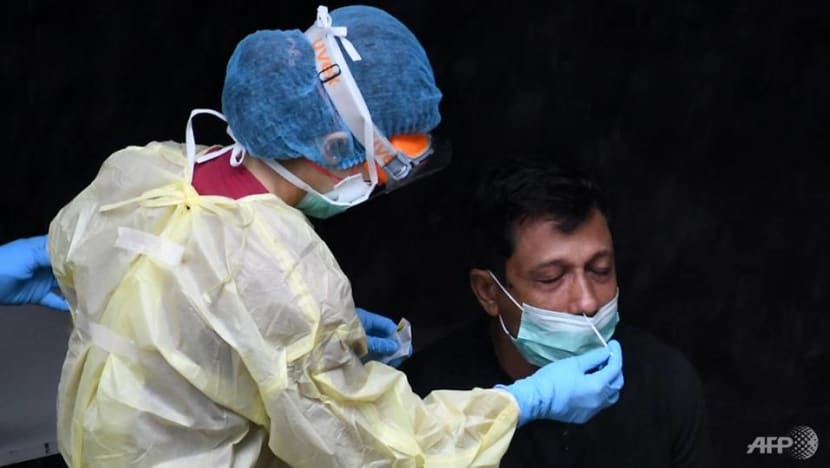Singapore must test 'faster, more liberally and extensively'; DIY tests soon available over the counter, says PM Lee
Singapore must test "faster, and more liberally and extensively" in order to detect COVID-19 cases more quickly, said Prime Minister Lee Hsien Loong on Monday (May 31).

A healthcare worker dressed in personal protective equipment collects a nasal swab sample for COVID-19 in Singapore on Apr 27, 2020. (Photo: AFP/Roslan Rahman)
SINGAPORE: In order to detect COVID-19 cases more quickly, Singapore must test "faster, and more liberally and extensively", said Prime Minister Lee Hsien Loong in his national address on Monday (May 31).
And this would mean making different tests available, including do-it-yourself (DIY) tests which can be purchased over the counter at pharmacies, said Mr Lee in his televised speech.
"Breathalyzer tests, which take just one minute, have been set up at the Causeway and the airport. They can be deployed to many other places too. And soon you will be able to purchase DIY tests over the counter at pharmacies. They are simple to use and not so uncomfortable," he explained.
READ: Singapore 'on track' to bring COVID-19 outbreak under control; curbs may be eased after Jun 13: PM Lee
READ: COVID-19 breath test gets provisional authorisation in Singapore, to undergo trial at land checkpoint
"You can administer these on your own. If you are worried that you may have COVID-19 and want to put your mind at ease. Or if you are a frontline worker and want to test yourself frequently or even daily."
As the COVID-19 virus mutates and becomes more transmissible, Singapore must respond by testing more widely, said Mr Lee.
Currently, there is rostered routine testing (RRT) in a number of higher-risk settings: Migrant worker dormitories, construction worksites, shipyards, air and sea ports, hospitals and nursing homes, he pointed out.
However, faster and cheaper tests will allow for routine testing at more workplaces, like offices, restaurants and shopping malls, said Mr Lee.
"We can also routinely test individuals whose occupations involve close contact with many people and could result in superspreading events, like taxi drivers and bus captains, physiotherapists, masseurs, stage performers, sports and fitness instructors and educators could all be tested regularly," he added.
This will "reassure" their customers, patients and students, and allow them to work safely even with the coronavirus in circulation, Mr Lee explained.
And Singapore is shifting its approach to testing, he said.
READ: Household members of people under COVID-19 quarantine now required to self-isolate at home: MOH
READ: Ample supply of food and essential items in Singapore: Gan Kim Yong on supply concerns arising from Malaysia lockdown
This means not only testing to identify infections when a new case pops up, but also to routinely and regularly test people who appear well, in normal work, social or community settings.
"Extensive testing will give us confidence to resume larger scale events or gatherings. For example, we can deploy fast and easy tests before a religious service, a football game, a concert, or a wedding reception," Mr Lee said.
"And participants can be assured that the event is COVID-19 safe. Therefore, you should expect routine, large-scale, fast and simple testing to be part of our new normal."
READ: Singapore accelerates national COVID-19 vaccination programme, students the next group to be inoculated
READ: Singapore ‘nudging’ in right direction with drop in unlinked cases over past two weeks: Ong Ye Kung
Being able to detect COVID-19 cases more quickly would mean that authorities can isolate them and ringfence their contacts promptly, before the virus spreads further, noted Mr Lee.
"Many different types of COVID-19 tests have become available ... antigen rapid tests (ART), saliva tests, breathalysers, wastewater surveillance, even sniffer dogs," he added.
"We have been using some of these and evaluating others for some time. Each of these new tests is suited to different use cases."
ARTs are "invaluable' as a quick check, noted Mr Lee. For one, they produce results much faster than the polymerase chain reaction (PCR) tests and are also cheaper and easier to administer, he said.
READ: Additional COVID-19 antigen rapid testing to be rolled out for people with symptoms
READ: People who want alternative COVID-19 vaccines can get them under special access route
But they are less sensitive than PCR tests and may miss some cases that are actually COVID-19 positive, Mr Lee pointed out.
"If you visit a GP (general practitioner) or polyclinic now with an acute respiratory infection, you will be given an ART, in addition to a PCR test. Within 30 minutes the ART will show whether you are likely to have COVID-19," he explained.
"If the result is positive, you can immediately be isolated. And the PCR test will confirm your diagnosis later, which may take a day or two. That way we reduce your chances of infecting others, if you are already ill but don’t realise it."
These alternatives to PCR tests can help to detect and isolate people quickly when they are most infectious, said Mr Lee.
"This will be a big help in slowing down the spread of COVID-19.”
BOOKMARK THIS: Our comprehensive coverage of the COVID-19 pandemic and its developments
Download our app or subscribe to our Telegram channel for the latest updates on the coronavirus outbreak: https://cna.asia/telegram












